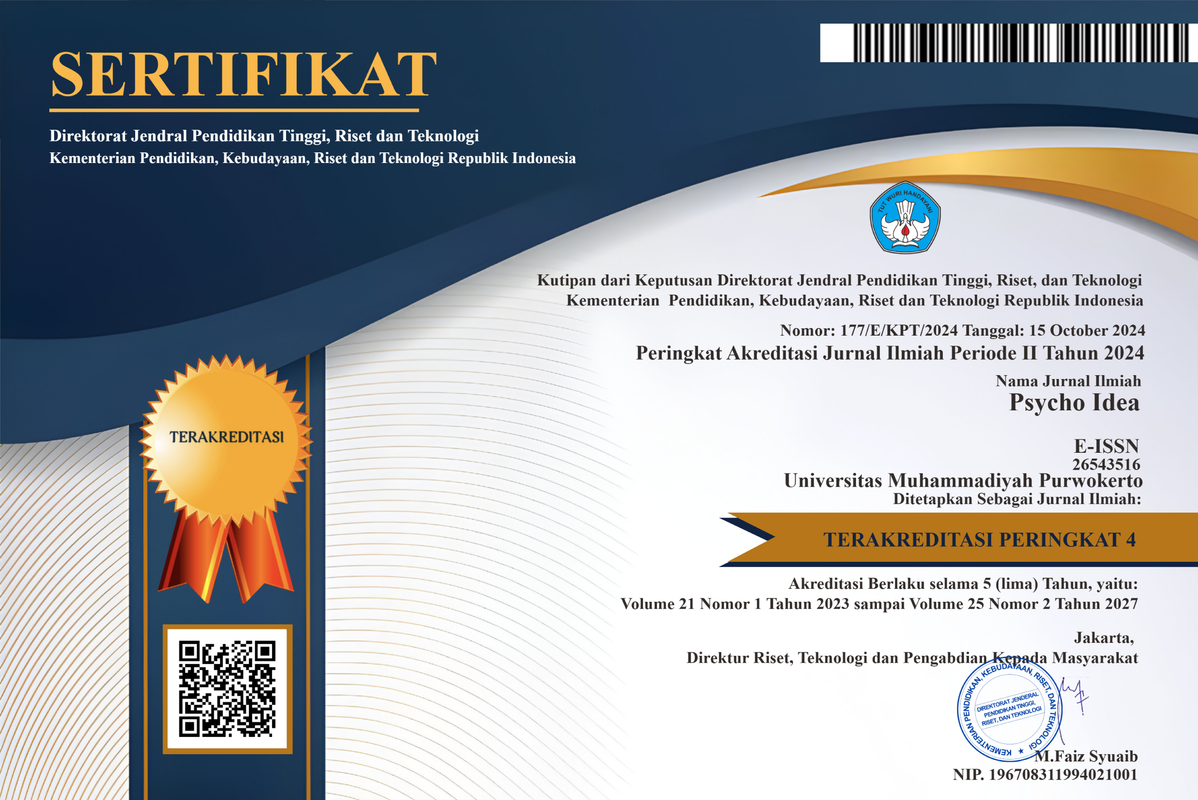Membangun Identitas Sosial dalam Organisasi Mahasiswa Pascasarjana
DOI:
https://doi.org/10.30595/psychoidea.v17i1.4030Keywords:
Identitas Etnis, Identitas Sosial, Organisasi Mahasiswa PascasarjanaAbstract
Organisasi Mahasiswa Pascasarjana merupakan organisasi yang terdiri dari bermacam latar belakang etnis, agama, hingga organisasi masyarakat. Tujuan penelitian ini adalah mendapatkan dinamika dalam membangun identitas sosial pada pengurus Organisasi Mahasiswa Pascasarjana. Penelitian ini menggunakan metode penelitian kualitatif dengan pendekatan fenomenologis. Pengambilan data dilakukan melalui wawancara semi terstruktur terhadap tiga orang subjek yang merupakan pengurus aktif organisasi tersebut yang berasal dari etnis yang berbeda. Hasil penelitian ini menunjukan bahwa kesetaraan dalam posisi diperlukan untuk membangun identitas sosial pada organisasi mahasiswa pascasarjana dalam organisasi yang terdiri dari berbagai macam latar belakang etnis, hal tersebut dapat muncul dalam upaya-upaya seperti keterbukaan untuk menerima kritik dan masukan jika ada perilaku yang kurang sesuai, membuka ruang komunikasi, dan juga perkembangan pola pikir sebagai mahasiswa pascasarjana. Kesimpulan dari penelitian ini adalah identitas etnis melebur menjadi identitas sebagai satu organisasi, hal tersebut dipengaruhi oleh beberapa faktor seperti latar belakang keluarga yang multi-etnis, kompleksitas budaya dari daerah asalnya, dan pengalaman berinteraksi dengan etnis lain.References
Brewer, M.B. & Gaertner, S.L. (2003). Toward Reduction of Prejudice: Intergroup Contact and Social Categorization. Dalam Brown, R. dan Gartner, S.L. Blackwell Handbook of Social Psychology: Intergroup Processes. Victoria: Blackwell Publishing.
Faturochman, Kurnianingsih, S., Kurniastuti, I., & Fathoni, N.S. (2011). The Role of Inter-Ethnic Marriage on Trust and Caution. Jurnal Psikologi, 38 (1), 73-81.
Hennesy, J., & West, M. A. (1999). Intergroup Behavior in Organizations: A Field Test of Social Identity Theory. Small Group Research, 30(3), 361–382.
Haslam, S.A. (2004). Psychology in Organization: The Social Identity Approach. California: Sage Publication.
Jaeger, S., & Vitalis, T. (2005). Ethnic Diversity in the New Zealand Police: Staff Perspectives. Equal Opportunities International, 24(1), 14–27.
Kenny, E. J., & Briner, R. B. (2010). Exploring Ethnicity in Organizations. Equality, Diversity, and Inclusion: An International Journal, 29(4), 348–363. doi:10.1108/02610151011042402.
Lathief, S. I.(2008). Psikologi Fenomenologi Eksistensialisme. Lamongan : Pustaka Ilalang.
Panggabean, H., Tjitra, H., & Murniati, J. (2014). Kearifan Lokal Keunggulan Global : Cakrawala Baru di Era Globalisasi. Jakarta : Elex Media Komputindo.
Pichler, S., Varma, A., & Budhwar, P. (2012). Antecedents and consequences of the social categorization of expatriates in India. The International Journal of Human Resource Management, 23( 5), 915–927.
Subandi, M.A. (2009). Psikologi Dzikir: Studi Fenomenologi Pengalaman Transformasi Religius. Yogyakarta: Pustaka Pelajar
Tajfel, H. (1982). Social Psychology of Intergroup Relations. Annual Review of Psychology, 33, 1–39.
Triandis, H.C. & Bhawuk, D.P.S. (1997). Culture Theory and the Meaning of Relatedness. Dalam Earley, P.C. dan Erez, M. (Ed.). New Perspectives on International Industrial/Organizational Psychology. San Fransisco: The New Lexington Press.
Weech-Maldonado, R., Dreachslin, J. L., & Kathryn, H. (2002). Racial/Ethnic Diversity Management and Culture Competency: The Case of Pennsylvania Hospital. Journal of Healthcare Management, 47(2), 111.Downloads
Published
Issue
Section
License
Authors published in this journal agree to the following terms:
- The copyright of each article is retained by the author (s) without restrictions
- The journal allows the author(s) to retain publishing rights without restrictions
- The author grants the journal the first publication rights with the work simultaneously licensed under the Creative Commons Attribution License, allowing others to share the work with an acknowledgment of authorship and the initial publication in this journal.
- Authors may enter into separate additional contractual agreements for the non-exclusive distribution of published journal versions of the work (for example, posting them to institutional repositories or publishing them in a book), with acknowledgment of their initial publication in this journal
- Authors are permitted and encouraged to post their work online (For example in the Institutional Repository or on their website) before and during the submission process, as this can lead to productive exchanges, as well as earlier and larger citations of published work
- Articles and all related material published are distributed under a Creative Commons Attribution-4.0 International Public License (CC - BY 4.0).
License
Psycho Idea is licensed under a Creative Commons Attribution- 4.0 International Public License (CC - BY 4.0).
You are free to :
Share — copy and redistribute the material in any medium or format
Adapt — remix, transform, and build upon the material for any purpose, even commercially












